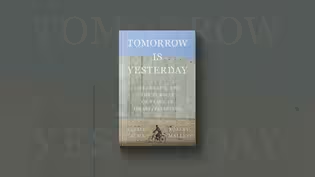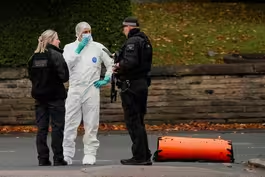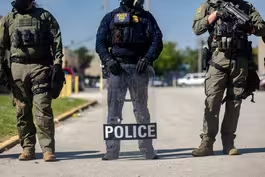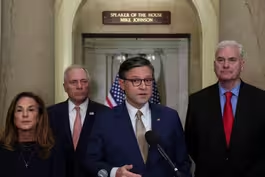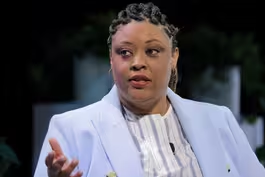
Millions lose access to telehealth in wake of shutdown
Clip: 10/2/2025 | 6m 52sVideo has Closed Captions
Millions lose access to telehealth in wake of shutdown
Two COVID-era Medicare programs, telehealth benefits and in-home hospital care, have ended abruptly for millions of Americans as a result of the government shutdown. Funding for both expired on September 30, and Congress failed to pass a new budget plan for either. Amna Nawaz discussed more with Kyle Zebley of the American Telemedicine Association.
Problems playing video? | Closed Captioning Feedback
Problems playing video? | Closed Captioning Feedback
Major corporate funding for the PBS News Hour is provided by BDO, BNSF, Consumer Cellular, American Cruise Lines, and Raymond James. Funding for the PBS NewsHour Weekend is provided by...

Millions lose access to telehealth in wake of shutdown
Clip: 10/2/2025 | 6m 52sVideo has Closed Captions
Two COVID-era Medicare programs, telehealth benefits and in-home hospital care, have ended abruptly for millions of Americans as a result of the government shutdown. Funding for both expired on September 30, and Congress failed to pass a new budget plan for either. Amna Nawaz discussed more with Kyle Zebley of the American Telemedicine Association.
Problems playing video? | Closed Captioning Feedback
How to Watch PBS News Hour
PBS News Hour is available to stream on pbs.org and the free PBS App, available on iPhone, Apple TV, Android TV, Android smartphones, Amazon Fire TV, Amazon Fire Tablet, Roku, Samsung Smart TV, and Vizio.
Providing Support for PBS.org
Learn Moreabout PBS online sponsorshipAMNA NAWAZ: Two COVID-era Medicare programs, telehealth benefits and in-home hospital care, have ended abruptly for millions of Americans as a result of the government shutdown.
Authorization for both expired on September 30 and Congress failed to pass a new budget plan for either.
That means many seniors on Medicare can no longer use telehealth services.
The program now reverts to pre-pandemic criteria, meaning Medicare enrollees in rural areas can still use telehealth, but in a designated hospital or clinic.
Meanwhile, in-home care recipients will either be discharged or go back into inpatient hospital care.
For more on this, I'm joined by Kyle Zebley.
He's senior vice president of public policy at the American Telemedicine Association.
Thank you for being here.
KYLE ZEBLEY, Senior Vice President of Public Policy, American Telemedicine Association: It's great to be here.
Thanks so much.
AMNA NAWAZ: Let's take each of these programs in turn.
When it comes to telehealth and the virtual appointments, we saw a surge of use in the pandemic, some seven million people using it last year.
Who's going to be most impacted by this shutdown?
KYLE ZEBLEY: By our older Americans and most disabled Americans.
They had access to something when they went to bed on Tuesday night.
They woke up with the government shutdown on Wednesday, and they found out that they no longer have access to these programs and flexibilities that have been in place for more than five years, since the beginning of the decade, since right before the real impact of the COVID-19 pandemic came to the United States.
AMNA NAWAZ: And the change is now reverting to these pre-pandemic criteria.
Explain that to me.
If you're enrolled in Medicare and you live in a rural area, you can still use it, but in a very specific way?
KYLE ZEBLEY: That's right.
And you said it well at the outset.
You have to meet two criteria.
And you have to meet both.
You have to be in a defined rural area and you have to be within the four walls of a Medicare provider's office.
It's head-spinning to go back to these restrictions.
They were put in place in law in 1997.
That may have been advanced at that time.
The technology had moved forward leaps and bounds by the beginning of the decade, before the COVID-19 pandemic.
We had been clamoring to get these flexibilities put in place.
And it took the COVID-19 pandemic to do it.
Now, unfortunately, all that progress goes away and has been now two days into this shutdown.
AMNA NAWAZ: So, potentially, we're talking about millions of people having their health care, access to health care impacted.
What does that mean, big picture?
KYLE ZEBLEY: Well, it means, most importantly, that patients are worse off today.
They have less access than they did two days ago.
It means that, for patients receiving cancer care, mental health areas of treatment, primary care treatments and visits, they no longer have access to this care that's clinically appropriate care, that meets them where they are, that is far more flexible than, of course, going into in-person settings.
It drags us backwards, not only to the beginning of the decade, really, again, in effect, in 1997, when these provisions were previously put into place in law.
AMNA NAWAZ: And hospital systems, health care providers have a choice to make here, I assume.
Could they continue to provide this care and hope they get reimbursed?
Are any doing that?
KYLE ZEBLEY: So, many are making really tough decisions.
They are either making the determination that they don't have the financial wherewithal to potentially eat these costs.
And, therefore, unfortunately, they're alerting patients now every day, every hour, practically speaking, across the country that they're no longer going to get those telehealth services they have come to rely on that's expanded access to care.
There are other health care systems and Medicare providers and provider groups that are saying, we're going to weather the storm, at least for a little while.
We're going to continue to offer these services because we want to continue to offer care to these patients we care so much about.
And, hopefully, the federal government and Congress will come together, bring these programs back, and retroactively pay for the services that were rendered during this lapse.
That's certainly what we're asking for.
And we hope our bipartisan telehealth champions will get it done when cooler heads prevail and the shutdown ends.
AMNA NAWAZ: There's also this other program, the in-home hospital services program that's been paused.
So, patients, my understanding, are basically monitored virtually, and they get daily provider visits.
So what happens to those patients now?
KYLE ZEBLEY: This is really clear-cut.
If there's any ambiguity or flexibility that is present for the Medicare telehealth flexibilities, that's not present here.
The Office of Management and Budget and the administration has made very clear that that program has ended, and it ended effective October 1 yesterday.
And they had instructed anybody that was participating in that program they need to be either, as you said, sent home or they need to go back into a hospital setting.
They were comfortable at their home.
They were getting clinically appropriate care.
They were getting care that they wanted to receive in this manner at a convalescent home.
It also opened up capacity in the hospitals.
That capacity increase has now, of course, gone away, and it's really stressing our overburdened health care system to force this to go back into place.
AMNA NAWAZ: Even just in the last 24, 48 hours, are you seeing the impact of that?
Are facilities becoming more crowded?
KYLE ZEBLEY: Oh, it's a devastating impact.
It set us back again significantly from bipartisan hard-won progress that we have made since the beginning of the pandemic.
What's a real tragedy about this is, yes, Americans are losing out.
They're losing out every day, increasingly so, the longer that these flexibilities have lapsed.
And it's a real shame because these are popular bipartisan programs put in place by President Trump, kept in place on a bipartisan basis in Congress really with no stated opposition throughout the Biden/Harris administration.
President Trump's been on the record in support.
He already signed an extension of these flexibilities earlier this year.
We really want to get out of these short -- the short-term thinking, get out of this discussion of having endless short-term extensions.
These programs should be made permanent.
And if things were functioning as I think they should, we would have been made permanent long ago.
But here we are, despite all that broad-based popularity, caught up as a victim of circumstance because of the shutdown.
AMNA NAWAZ: Well, until that shutdown ends, for anyone watching this at home who may be impacted by either one of these changes, what's your best advice to them?
What are their options?
KYLE ZEBLEY: Well, their options are to hope that their providers and their health care systems that they're working with have the ability to continue to deliver that care, even though they might not be covered and reimbursed.
But most importantly and ideally, they pick up the phone, they call their member of Congress, and they say please end this shutdown of the Medicare telehealth flexibilities and acute hospital care at home.
You don't want to sit on the sidelines if you care about this if your loved ones are depending on it, if you yourself are depending on it.
You need to have that agency to try to make sure Congress gets the message that it's unacceptable to have these popular bipartisan programs lapse.
And we shouldn't be a victim of this other dynamic that has nothing to do with our community and the people that rely on telehealth.
AMNA NAWAZ: Kyle Zebley with the American Telemedicine Association, thank you so much for being here.
KYLE ZEBLEY: Thank you.
GOP's Rounds: No negotiations with Dems until shutdown ends
Video has Closed Captions
Clip: 10/2/2025 | 7m 58s | GOP Sen. Rounds: 'We're not going to negotiate' with Dems until shutdown ends (7m 58s)
New book explores Israeli-Palestinian peace efforts
Video has Closed Captions
Clip: 10/2/2025 | 7m 14s | 'Tomorrow is Yesterday' explores why Israeli-Palestinian peace efforts have fallen short (7m 14s)
News Wrap: 2 killed in terror attack on British synagogue
Video has Closed Captions
Clip: 10/2/2025 | 8m 34s | News Wrap: 2 killed in terror attack on British synagogue (8m 34s)
Refugee living in U.S. since childhood faces deportation
Video has Closed Captions
Clip: 10/2/2025 | 7m 29s | Laotian refugee living in U.S. since childhood faces threat of deportation (7m 29s)
Trump threatens mass firings as shutdown continues
Video has Closed Captions
Clip: 10/2/2025 | 5m 36s | Trump threatens mass firings as shutdown continues with no signs of potential deal (5m 36s)
White House 'using shutdown as excuse' for firings, Dem says
Video has Closed Captions
Clip: 10/2/2025 | 8m 25s | White House 'using shutdown as excuse' for more mass firings, Democrat says (8m 25s)
Providing Support for PBS.org
Learn Moreabout PBS online sponsorship
- News and Public Affairs

FRONTLINE is investigative journalism that questions, explains and changes our world.

- News and Public Affairs

Amanpour and Company features conversations with leaders and decision makers.












Support for PBS provided by:
Major corporate funding for the PBS News Hour is provided by BDO, BNSF, Consumer Cellular, American Cruise Lines, and Raymond James. Funding for the PBS NewsHour Weekend is provided by...

